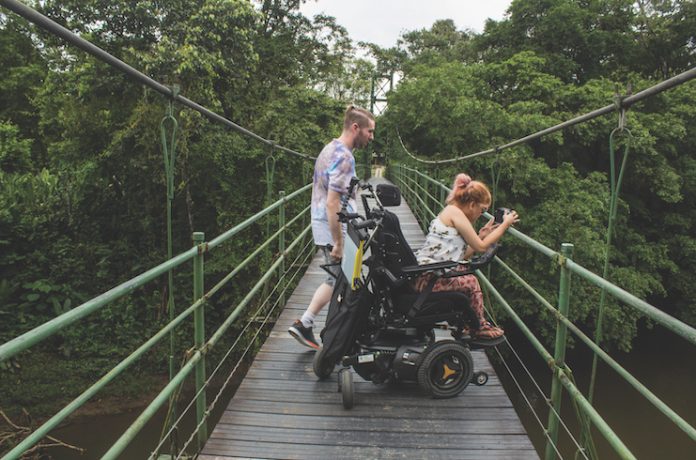
Across the United States and beyond, travelers have shown they are ready to get back on the road, and hoteliers must now adapt to accommodate returning guests, ensure their safety, and foster positive travel experiences. According to Alvaro Silberstein and Camilo Navarro, founders of Wheel the World, guests with disabilities are likewise looking to get back to traveling with their friends and family, but are often overlooked. Wheel the World, an online travel booking platform for people with disabilities and seniors, is working to reverse the trend. The website was created in 2018 by Silberstein, the organization’s CEO, and Navarro, COO, after they visited Torres del Paine National Park in Chile’s Patagonia region. The experience of navigating that trip with Silberstein in a wheelchair inspired these friends to create a database of accessible multi-day excursions, activities, and lodging options to empower individuals to design an adventure that meets their accessibility needs so they can explore the world without limitations. LODGING spoke with Silberstein and Navarro to find out what hotels can do to provide more accessible travel experiences.
Digitalize information.
Silberstein says hotel websites do not always showcase their accessible aspects—information that is vital for guests with specific needs when deciding where is the best fit for them to stay. “You can find everything about their prices, locations, and designs…but detailed information about accessibility is not clear, and that’s very important because disabilities are diverse.” For instance, a guest traveling with a wheelchair would need to know information like the width of doors at the property, the height of beds in rooms, what entrances look like, and what types of showers are offered.
Universal design.
To ensure accessibility on property for diverse needs, Silberstein and Navarro both touched on the importance of designing all guestrooms to be completely accessible—not just a select few. The booking process is often made more complicated for guests with disabilities because many hotels have a limited supply of accessible rooms and require guests to call to make a reservation. Because of these inefficiencies, Navarro says it is not uncommon for reservations to get mixed up or for an accessible room to not be available upon a guest’s arrival. “If you’re building a hotel and all of your rooms are accessible, you will never have the problem of a guest’s needs not being met,” says Silberstein. Hoteliers should incorporate flexibility and variety into guestrooms and describe accessible attributes across their booking channels to accommodate travelers’ diverse needs and help them plan ahead.
Educate staff.
Navarro says it’s not only about changing a hotel’s infrastructure but changing the way teams typically think about disabilities. “Hoteliers need to understand how they should treat disabled guests—from the language they use to the assistance they put in.” To help improve their understanding, Navarro says that Wheel the World created an online course reviewing what its hotel partners need to know about accessibility. The program is segmented and covers a range of topics, including transportation, tours, activities, and more.
Reduce the gap.
“People with disabilities are spending $30 billion a year on travel,” says Navarro. Becoming a better partner and working towards a more accessible and inclusive industry will not only create revenue streams for hotels, but will benefit the entire industry and all travelers at every stage of their life. Many of us will experience limited mobility at some point in our lives, Navarro points out, “so if you want to keep traveling, you need to start making your services more accessible now.”











